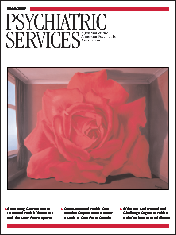Innovations: Alcohol & Drug Abuse: Spirituality in Alcoholics Anonymous: A Valuable Adjunct to Psychiatric Services
Abstract
Alcoholics Anonymous (AA) is described as a spiritual fellowship by many of its members, but its spiritual orientation needs to be better understood by clinicians and researchers. Spirituality is a latent construct, one that is inferred from multiple component dimensions, such as social psychology, neurophysiology, and treatment outcome research. Mechanisms related to its role in promotion of recovery in AA are discussed from the perspective of these findings, along with related options for professionally grounded treatment, such as Twelve-Step Facilitation. This discussion illustrates the importance of further research on AA and spirituality and of employing them in the provision of psychiatric services.



